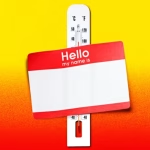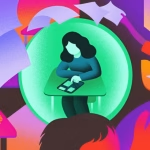I don’t own a smartphone, in contrast to almost 98 percent of Americans under 50. To be honest, I’ve never owned a smartphone. I’ve never used Venmo, Spotify, a dating app, called an Uber, “dropped a pin,” been in a group chat, or been envious of someone on Instagram (since I’ve never used Instagram). This used to make me feel ashamed, or more accurately, it was made to make me feel ashamed. When I explained that I didn’t have a smartphone, people either didn’t believe me for a long time or responded with a kind of embarrassed contempt, as if they had just discovered that I was the cause of an unpleasant smell they had been ignoring. However, the response has evolved in the last two years. The offline, air-gapped, inaccessible person has become a source of fascination, if not envy, as the costs of constantly being online have become more obvious. Being a Never-Phoner—a holdout who somehow managed to go from being left behind to ahead of the curve—has made me feel a little smug, I must admit.
It’s hard to say how far ahead. The hunched posture, long horizontal neck creases of the power scroller, social atrophy, and stunned, preoccupied affect are some of the worst effects of smartphones that I believe I have escaped. Based on the number of people I’ve seen in movie theaters who either check their phones every few minutes (roughly half) or scroll through the entire film (always a handful), I’m fairly certain that I have a longer attention span than many others. By the way, I’ll notify you if I see you acting in a similar manner: I’ll call you an “iPad baby” if you check your phone more than once every hour, and “a hog at the slop trough” if you play a Spotify playlist that is created automatically.
There have undoubtedly been drawbacks to going phoneless. Receipts, utility bills torn in half to take me to new places, and maps scrawled on napkins fill the pockets of every jacket I own. I once mislabeled the streets on my hurriedly drawn map, which caused me to miss a crucial job interview. The two twenties I offer are taken up like a severed ear when someone says, “Everyone Venmo me $37.50,” at the conclusion of group dinners. Furthermore, I would be lying if I claimed that I didn’t occasionally feel nostalgic for all the group chat banter I’m presumably missing out on.
I’ve held out, though it’s difficult to pinpoint why. I don’t really agree with the typical anti-smartphone viewpoints. The grumpy “Get off your darn phone!” seems a bit too similar to “Get off my lawn!” This instinctive dislike of novelty is the source of all bad things, if not all boredom. It also appears that the widely accepted advice to “be fully present in the moment” is misplaced. I believe that the person who is completely engrossed in an Instagram reel while stumbling into the crosswalk against the light, barely avoiding collision with their childhood dog, is probably living in the present to the extent that only Buddhist monks can; the only issue is that it’s the wrong moment.
I believe that the main reason I don’t choose the easier phone life is that I can’t help but notice how much people have changed in the ten or so years since smartphones became commonplace. The walking scroller’s ability to move through the crowd without being noticed—possibly with bat-like sonar—used to astound me. On occasion, though, I would play a game of chicken with one of these people, walking straight toward them to see when they would stray, whether out of a vague antisocial impulse (which is not uncommon) or out of simple necessity (like negotiating a narrow aisle at the grocery store). Surprisingly often, they didn’t, and they would always point the finger at me after the crash. In the end, I came to the conclusion that they aren’t navigating anything; rather, they have delegated control of their physical selves to everyone in their immediate vicinity, much like many people have delegated control of their memory to their phones.
At least they’re walking and not in a car, you’re probably thinking. However, a lot of people also use their phones while driving. The driver who yields to the car crossing the street at a four-way stop frequently takes a quick peek at their phone for a half-second while they wait. I frequently witness people at red lights pressing the gas when the car in front of them moves, without looking up from their phones when the light turns green. Late at night, I see people scrolling in parked cars, which is less dangerous but somehow more unsettling. These people usually glare back at me when I glance over, startled by the unexpected appearance of a disembodied, underlit face on an otherwise empty block, as if I’ve broken some secret agreement. I try to be optimistic; perhaps they have six obnoxious children running around the house or share a bed with someone who sleeps light. However, it occurs frequently enough for me to consider them the epitome of modern alienation. We had Bowling Alone twenty-five years ago; scrolling alone is what we have today.
Naturally, a phone is merely a medium, no more or less than a laptop or a book, and the generalization that phones are bad ignores the fact that people can use them for a plethora of purposes, many of which are productive. The man at the gym who is bent over his phone may be reading the most recent studies on cutting-edge cancer therapies. But most likely not. I once noticed a guy at my gym using the stationary bike in front of me, and I glanced over his shoulder to see him conversing with an AI-anime-schoolgirl chatbot on his phone. In a tiny, breathy voice, she was telling him how she had been in line at the store earlier and how she had politely spoken up and asked someone to move to the back of the line when they cut in front of her. “That’s fantastic, sweetie,” he said. “You have my utmost admiration for defending yourself.”
It’s self-deprecating, a devitalized replacement for some real-life activities, and extremely discouraging, at least to a phoneless naive. This is more or less typical of the things I see people doing on their phones. I’ve frequently seen friends open a group chat, sigh, and scroll through a massive backlog of unread messages while automatically displaying the laughing and heart-eye emojis—friendship as a data-entry job that you can’t quit but aren’t paid for. One of my friends frequently lets me observe him using dating apps, even though I have a girlfriend. He overestimates his own attractiveness while underestimating the attractiveness of the women he swipes on, just like most men do, including myself. He will say, “I suppose I’ll give her a chance,” swiping directly at a woman for whom ancient civilizations would have waged war.
This friend tells me that he is “out there and on the market” and that there is “nothing more he can do” as long as he completes his daily allotment of swipes. However, we frequent the same coffee shop and see a woman who appears to be his ideal match multiple times a week. He comes in every day, reads his little autofiction book, and then pulls out his laptop to work on a small autofiction manuscript. She comes in every day, reads her little autofiction book, and then pulls out her laptop to work on what we’ve assumed is a little autofiction manuscript. They occasionally happen to sit next to each other at tables that are so close that I’m sure he can smell her perfume. On these occasions, I make an effort to support him from the other side of the room by subtly pushing my hips beneath the table and raising my eyebrows suggestively. I approach him after she leaves and inquire as to why he didn’t speak with her; he responds as though I had advised a self-appendectomy. Regarding the woman he just saw in person for the 300th time, he remarks, “Perhaps I’ll see her on the apps.”
I don’t hold him responsible. He is 36 years old and has only ever dated via apps. It does appear to be much more difficult to meet people in public now than it was even ten years ago. Most of the people in the bars appear to be insular friend groups and anxiously anticipating their app dates. There aren’t many things more depressing than seeing app users meet for the first time. “Taylor? Hello, Riley.” (The leaning hug with feet kept at maximum distance, the firm salesmanlike handshake, and both people talking over each other in their job-interview voices.) I frequently witness patrons enter a bar, place an order for a single drink, spend twenty to thirty minutes staring at their phones, and then depart. Perhaps they are being abandoned. Or perhaps they’re carrying out their original plan precisely. They often appear dissatisfied, though; I suppose their visit was an attempt at something, allowing serendipity to tap them on the shoulder and say, “Here you go, here’s the encounter that will fix you.”
As I watch all of this, I feel like a great deal of libidinal and social energy has been taken out of the real world. Where is everything now? Centers for data? The remarks? I disagree with the many critics of smartphones who claim that they have made people narcissistic. People are essential to narcissists; the emotional energy of interaction is what keeps them going. A trait more akin to solipsism—the conviction that you are the only person who truly exists and that everyone else is essentially unreal—is what the blind walking scroller, the reckless texter, and the unrealistic dating app swiper have in common. However, solipsism is a type of seclusion, and to get used to it is to become a sort of recluse who can pass for normal but is only at ease moving among your feeds and murmuring to yourself in a sinister manner.
I am aware that by declining to purchase a smartphone, I am tacitly acknowledging that I would develop a similar addiction to it as anyone else. My girlfriend recently gave me her phone and instructed me to play music for sex; after a few minutes, she leaned over to ask why it was taking so long. I had been browsing the soft-serve ice cream Wikipedia page. I don’t even know how I got there or why I was looking at that. I started swiping and scrolling as if I had gone into a fugue state due to the sudden availability of limitless information. I suppose I gazed into the emptiness and plunged in. To be honest, it felt good to give up.











